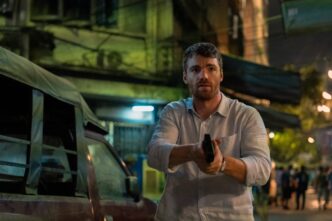Fagun Haway is a movie about the language movement of 1952. It is a movie about love. The movie depicts the circumstances and unrest that persists surrounding the state language of Pakistan in the town of Chandranagar in East Pakistan.
The movie starts with Pakistani police officer Jamshed Ali Khan being transferred to Chandranagar. He is repelled by anything related to Bangla, be that the cuisine or the language. On the other hand, there are two university and medical college students, Nasir and Dipti who begin to develop a friendship which eventually turns into a romance while working together to bring Dinbondhu Mitro’s play Nildorpon to stage. ‘Falgun Hawae’ is based on the book ‘Bou Kotha Kou’ written by Hafizur Rahman.

“The biggest challenge in making this movie was to recreate Bangladesh as it was 66 years ago. Any car or motorcycle you will use has to be from 1952. Even the typewriter, radio, the roads, clothes and the boat.” — said director Toukir Ahmed in an interview with Prothom Alo.
The set will transport you back to the 1950s. The attire of the actors, the tea stall where everyone gathers for adda, etc were so neatly arranged and pleasing to the eyes. The drone shots of the rural Bangladesh were splendid. My personal favorite part of the design and CGI team was the haunted aura that they created when the stage actors dressed up as ghosts to scare people. The dialogues were pretty amusing at times.

Siam Ahmed has done an impressive job as the university student Nasir. If he continues to work like this and delivers superb performances, we have a superstar in the making. Tisha is a skilled and experienced actress and has blended into the character of ‘Dipti’ perfectly. Saju Khadem is his true self in the movie. We would have to reconfirm it from Toukir Ahmed but his performance would make you wonder if the role was written keeping Saju Khadem in mind.
Indian actor Yashpal Sharma’s portrayal of the cruel, Bangla hating Pakistani police officer was spot on. The fits of rage or the intense repulsion towards the Bangla language fits wonderfully with his role.
Toukir Ahmed brought together a cluster of stellar actors and they pulled it off excellently.
Toukir Ahmed, himself has done a brilliant job in terms of directing the film, writing the script and the dialogues. Most producers do not want to invest in projects like these which are not purely commercial. Toukir Ahmed continued his search despite the few initial rejections and was finally able to get Impress Telefilms on board.
Only one song from the movie was released. The lack of songs will not hamper your experience. The background music and the small excerpts from different Bangla and Urdu songs will more than make up for it.
A special screening of this movie was organized for President Advocate Abdul Hamid. ‘This will inspire new generations and help them to be more geared up in the spirit of the freedom and struggle,’ — the President remarked.

You will get to laugh your heart out, curse the Pakistanis for the oppression of the people of East Pakistan, empathize with the Bangali police officers who are forced to speak in Urdu and humiliated by the Pakistani officer Jamshed Ali Khan ands watch in admiration as the young rebels march with ‘Rashtrobhasha Bangla chai.’ signboards.
The cinema industry of Bangladesh is changing, although gradually.
Fagun Haway is a movie that will probably go down as one of those classic movies about a historical movement in the history of the cinema of Bangladesh.
There was laughter, empathy, patriotism, love, friendship, cruelty and tragedy. It’s a complete package. We need more movies like this.






